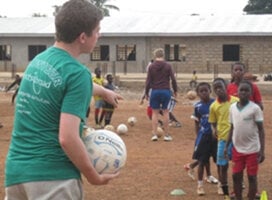High School Abroad in Ghana
As one of Africa’s most peaceful countries, Ghana is a great place for students to go to in high school. It's a tropical country in West Africa and located on the Gulf of Guinea and the Atlantic Ocean. Although Ghana is a developing country, it has about twice the per capita output of West Africa’s poorest countries due to its natural resources (it produces the second most cocoa beans in the world… can you say “chocolate”?!)
High school programs in Ghana tend to focus on volunteering or service learning, or cultural immersion through a summer program or teen travel. Spend high school in Ghana and get to know this warm and welcoming coastal nation. Who knows? You might just find yourself returning here again and again.
Ghana is best for students who want to go to a tolerant and diverse African country, where service opportunities are available.
Photo Credits: chadskeers.
Volunteer and service learning programs are the most popular program type in Ghana for high school students. These are great options to explore Ghana, while also learning more about some of the developmental issues it faces. These programs can be general, or focused on areas in need, such as health and AIDS awareness, environmental conservation, and education, just to name a few.
Usually, teen travel programs and summer programs will incorporate some aspect of volunteer work as well, if they are not totally focused on service learning components already. Those that don't, however, will seek to educate students on an aspect of Ghanian culture or history while traveling to different parts of the country.
Popular cities
Accra is the capital and largest city of Ghana and most programs are either based out of there or will start there. It is also the country’s international, economic, and business hub. Other options include Kumasi (also known as “The Garden City” for its variety of beautiful species of plants and flowers), and Cape Coast (a city and fishing port).
Student visa requirements
In order to enter Ghana, travelers must have a visa authorized by the government of Ghana. You must apply for it at a Ghanaian embassy (and make sure to do it as soon as possible because it can take several weeks!). Visitors must also have a yellow fever vaccination and be able to produce proof on arrival.
Housing
Students usually stay in homestays while in Ghana. This allows you to fully immerse yourself into Ghanaian culture and daily life. If you are in a more rural area, be prepared to not have accommodations be like Western countries (this takes an open mind and lots of flexibility, but is so worth it!)
Regardless, be prepared for power outages and to possibly not have hot, running water. Your accommodation in Ghana is likely to be pretty basic, though comfortable.
Costs
Being in Ghana is fairly inexpensive however traveling there might be what costs you the most. Once there, you can get away with a budget of $10 - 20 per day for personal expenses (especially if your program fees cover the cost of housing, in-country transportation, and some meals).
Packing tips
Ghana is a tropical country, so keep that in mind when packing. This means you should pack lightweight clothing that won't make you too hot, but will also protect you from the sun.
At the same time, you shouldn't pack overly revealing clothing -- knee length skirts are a must for female travelers -- and keep in mind that Ghanaians take care in dressing well. You'll have a lot more respect from your host family if you're not in scrubbed out t-shirts and torn cargo shorts every day. Something like a basic t-shirt and presentable shorts / skirts are enough.
If you're staying with a host family, think about bringing them a small gift from your home country, city, or neighborhood so they can learn something about you and back home!
Also be sure to pack:
- A headlamp / flashlight (in case of power outages)
- Converter
- Snacks
- Mosquito repellant
- Sunscreen
- Basic first aid kit
Health
You should make sure you are up to date on your routine vaccinations with your primary care doctor. You also need to get a yellow fever vaccination before entering Ghana and be able to provide proof of this. You should also talk to a travel doctor about bringing malaria prophylaxis but definitely pack insect repellent. (Note: the mosquitos that carry malaria are active at dusk / night.)
Only drink bottled water while there (and avoid ice) and be cautious of raw produce. That said, don't be afraid to try the street food -- just make sure it's freshly cooked.
Safety
Ghana is relatively safe but you should still use precaution. Don’t bring valuables, always stay in a group or with a partner, and don't go out alone at night. You should also avoid petting stray dogs and animals. They aren't domestic pets like at home and may be aggressive or infected with rabies.








